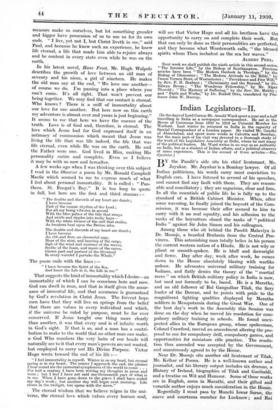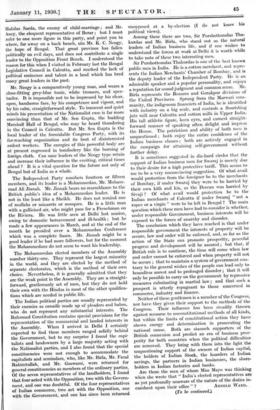Indian Legislators—II.
[In the days of Lord Curzon Mr. Arnold Ward spent a year and a half travelling in India as a newspaper correspondent. He sat in the House of Commons from 1910 to 1918 as Unionist Member for Watford. Last winter he returned to India in the capacity of Special Correspondent of a London paper. He visited Mr. Gandhi at Ahmedabad, and spent some weeks in Calcutta and Bombay, but the main part of his visit was devoted to a thorough study of the work of the Legislative Assembly at Delhi, where he met many of the political leaders. Mr. Ward writes in no way as an authority on India, but as a student of Indian affairs, and a political observer of some experience. This is the second of time articles.—Eod Spectator.] BY the Pandit's side sits his chief lieutenant, Mr. Jayakar. Mr. Jayakar is a Bombay lawyer. Of all Indian politicians, his words carry most conviction to English ears. I have listened to several of his speeches, and cannot find any fault with them. They are reason- able and conciliatory ; they are sagacious, clear and firm. In all the essentials of public life he is fully up to the standard of a British Cabinet Minister. When, after some wavering, he finally joined the boycott of the Com- mission, it was because their offer seemed to him to carry with it no real equality, and his adhesion to the ranks of the boycotters closed the ranks of "political India " against Sir John Simon and his colleagues.
Among those who sit behind the Pandit Malaviya is Dr. Moonje, a bearded Brahmin from the Central Pro- vinces. This astonishing man totally belies in his person the current western notion of a Hindu. He is not wily or pliant or smooth-spoken. He is bluff and downright and fierce. Day after day, week after week, he comes down to the House absolutely blazing with warlike ardour. He advocates universal military training for Indians, and flatly denies the theory of the " martial races " on which British military policy in India is now, but used not formerly to be, based. He is a Maratha, and an old follower of Bal Gangadhar Tilak, the fiery leader of the Deccan, and he points with pride to the magnificent fighting qualities displayed by Maratha soldiers in Mesopotamia during the Great War. One of the best day's work in the Assembly this Session was done on the day when he moved his resolution for com- pulsory military training in schools. He found unex- pected allies in the European group, whose spokesman, Colonel Crawford, moved an amendment altering the pro- posal to one for compulsory drill, compulsory games, and opportunities for miniature rifle practice. The resolu- tion thus amended was accepted by the Government, and unanimously agreed to by the House.
Near Dr. Moonje sits another old, lieutenant of Tilak, Mr. Kelkar of Poona. He is a well-known author and journalist, and his literary output includes six dramas, a History of Ireland, biographies of Tilak and Garibaldi, and a treatise on Wit and Humour. Some of these works are in English, some in Marathi, and their gifted and versatile author enjoys much consideration in the Houk.
Regretfully I must pass by Munchi. Iswar Saran, the suave and courteous member for Lucknow ; and Rai Habilas Sarda, the enemy of child-marriage ; and Mr. A ney, the eloquent representative of Berar ; but I must refer to one more figure in this party, and point you to where, far away on a back bench, sits Mr. K. C. Neogy, the hope of Bengal. That great province has fallen politically on evil days, and does not contribute a single leader to the Opposition Front Bench. I understood the reason for this when I visited in February last the Bengal Legislative Council in Calcutta, and marked the lack of political eminence and talent in a land which has bred many, great leaders in the past.
Mr. Neogy is a comparatively young man, and wears a close-fitting grey-blue tunic, white trousers, and spec- tacles. It is impossible not to be impressed by his clear, open, handsome face, by his competence and vigour, and by his calm, straightforward style. To innocent and quiet minds his presentation of the Nationalist case is far more convincing than that of Mr. Sen Gupta, the budding Marshall 'Hall of Bengal, who may be heard thundering in the Council in Calcutta. But Mr. Seri Gupta is the local leader of the formidable Congress Party, with its far-reaching organization and its host of disinterested ardent workers. The energies of this powerful body are at present engrossed in tomfoolery like the burning of foreign cloth. Can sane leaders of the Neogy type retain and increase their influence in the exciting, critical times ahead ? It is a vital question for the future not only of Bengal but of India as a whole.
The Independent Party numbers fourteen or fifteen members, and its leader is a Mohammedan, Mr. Muham-. mad All Jirmah. Mr. Jinnah bears no resemblance to the British public's idea of a Mohammedan leader: He is not in the least like a Sheikh. He does not remind one of mullahs or minarets or mosques. He is a little man 'with a gallicised air, who might pass for a Frenchman on the Riviera. He was little seen at Delhi last session, owing •to' domestic bereavement and ill-health ; but he made a few appearances in March, and at the end of the month he presided over a Mohammedan. Conference which was a complete fiasco. Mr. Jinnah might be a good leader if he had more followers, but for the moment the Mohammedans do not seem to want his leadership.
The Mohammedan elected members of the Assembly number thirty-one. They represent the largest minority in the world, and they are elected by the method of separate electorates, which is the method of their own choice. Nevertheless, it is generally admitted that they are the weak point in the Assembly. They are a straight- forward, gentlemanly set of, men, but they do not hold their own with the Hindus in most of the other qualifica- tions which are needed in public life.
The Indian political parties are usually represented by their enemies as canaille "made up of pleaders and babus, who do not represent any substantial interests. The Reformed Constitution contains special provisions for the representation of the commercial and landed interests in the Assembly. When I arrived in Delhi I certainly expected to find these members ranged solidly behind the Government, but to my surprise I found the capi- talists and landowners by a large majority acting with the Nationalist parties, and I also found that the special constituencies were not enough to accommodate the capitalists and zemindars, who, like Mr. Birla, Mr. Fazal Rahimtullah, and Mr. Goswami, were returned for general constituencies as members of the ordinary parties. Of the seven representatives of the landholders, I found that four acted with the. Opposition, two with the Govern- ment, and one was doubtful. Of the four representatives of Indian commerce, two act with the Opposition, one with the Government, and one has since been returned unopposed at a by-election (I do not know his political views).
• Among these there are two, Sir Purshottomdas Tha- kurdas and Mr. Birla, who stand out as the natural leaders of Indian business life, and if one wishes to understand the forces at work at Delhi it is worth while to take note of these two interesting men.
Sir Purshottomdas Thakurdas is one of the best known public men in India. He is a cotton merchant, and repre- sents the Indian Merchants' Chamber of Bombay, and is the deputy leader of the Independent Party. He is an admirable speaker and a popular personality, and enjoys a reputation for sound judgment and common sense. Mr. Birla represents the Benares and Gorakpur divisions of the United Provinces. Sprung from the Marwari coin, munity, the indigenous financiers of India, he is identified with industry on a big scale, and controls a flourishing jute mill near Calcutta and cotton mills in Upper India. His tall athletic figure, keen eyes, and earnest straight- forward manner of speaking often delight and impress the House. The patriotism and ability of both men is unquestioned ; both enjoy the entire confidence of the Indian business classes ; both are actively engaged in the campaign for attaining self-government without further delay.
It is sometimes suggested in die-hard circles that the support of Indian business men for Swaraj is merely due to their desire for a high protective tariff. This seems to me to be a very unconvincing suggestion. Of what avail would protection from the foreigner be to the merchants of Bombay, if under Swaraj they were to be harried by their own kith and kin, as the Deccan was harried by Sivaji ? Of what avail would protection be to the Indian merchants of Calcutta if under Swaraj " not a rupee or a virgin " were to be left in Bengal ? The main question which these men have had to consider is whether, under responsible Government, business interests will be exposed to the forces of anarchy and disorder.
The conclusion which they have reached is that under responsible government the interests of property will be secure, law and order will be enforced, and, so far as the action of the State can promote prosperity, peaceful progress and development will be assured ; but that, if British rule is to continue, the time will come when law and order cannot be enforced and when property will not be secure ; that to maintain a system of government con- trary to the general wishes of the people can lead only to boundless unrest and to prolonged disorder ; that it will only be possible to carry on the government by repressive measures culminating in martial law ; and that such a prospect is utterly repugnant to those concerned in commerce, industry and finance.
Neither of these gentlemen is a member of the Congress, nor have they given their support to the methods of the Congress. Their influence has been steadily thrown against recourse to unconstitutional methods of all kinds, but within the limits of constitutional action they have shown energy and determination in prosecuting the national cause. Both are staunch supporters of the British connexion and predict an era of business pros- perity for both countries when the political difficulties are removed. They bring with them into the fight the unquestioning support of the owners of Indian capital, the holders of Indian Stock, the hoarders of Indian savings, the partners in Indian businesses, the share- holders in Indian factories and banks.
Are these the men of whom Miss Mayo was thinking when she wrote that " elected representatives are .as yet profoundly unaware of the nature of the duties in- cumbent upon their office " ARNOLD WARD.
(To be continued. -







































 Previous page
Previous page